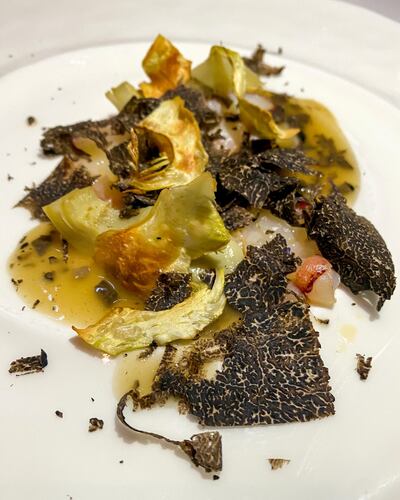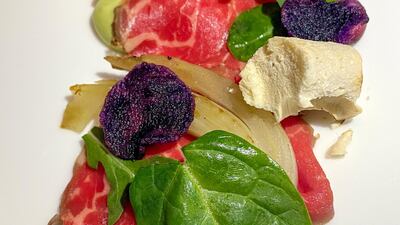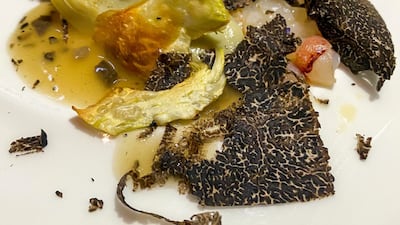“If a guest is sitting at your table, then you are responsible for their health.” So says top chef Heinz Beck, who believes high-end restaurants must serve healthy food if they are to remain relevant in the future. This he predicts will be a worldwide trend as restrictions around Covid-19 lift and people start eating out more often.
Food as prevention
Accordingly, his Dubai restaurant, Social by Heinz Beck at the Waldorf Astoria on the Palm, has adapted, and launched a new “informal” menu, which is not only less expensive, but also focuses on seasonal produce and caters to dietary requirements.
"Now everybody will be much more about wellness and creating high-quality food that also considers nutrition, prepared in the proper way so you don't lose the vitamins," Beck tells The National while on a trip to the UAE. "So for the new menu, we've made it healthier and easier to digest."
The reason, he says, is a more healthy approach to eating will continue post-pandemic. “The first prevention is not medicine, it’s using what you eat. Coming out of this pandemic, people are more aware how important it is to eat right [so] your immune system will become much stronger,” Beck adds. “You will become more resistant, brighter and have more enthusiasm because food is fundamental for well-being.”
Beck believes that people have become used to eating at home, so there’s even more of an expectation that restaurants need to provide something a bit special, but there’s no reason why that can’t be healthy as well. “We are what we eat, so it’s important that we are using the food for prevention.”
With this in mind, he’s also launching a medical retreat in Italy in April, a five-star property with 100 rooms, wellness and medical centres and five food lines – epigenetic food, weight management, detox, better ageing and happy food.
For his restaurants, though, it’s about finding the balance. “It’s a mix of health and flavour because people often wrongly believe if it’s flavourful, then it will be heavy to digest. What we are now doing for the a la carte menu is somewhere between casual and fine dining, it’s lighter and you could eat it every day.”
New healthy menu at Social by Heinz Beck

When it’s pointed out that his restaurant is known for its veal, lobster and beef cheek dishes, which are all traditionally rich foods, Beck says: “Food is only heavy and rich if you make it heavy and rich, and the menu increasingly has a lot of fish, vegetables and grains, chia seeds, fruit and herbs, and from all these ingredients you can cook beautiful dishes.”
The new menu serves up dishes such as yellow corn chicken breast with fennel and cereal, sea bass fillet, tofu with seasonal vegetables and a vegan panzanella.
While numerous big-name chefs have opened full vegetarian restaurants, Beck baulks at the suggestion of meat-free menus. “I will not remove, I will reduce – people have to come to enjoy and I have to give them a culinary experience.”
Consistency is key
Dubai is notorious for its fickle foodscape, with many restaurants shutting shop or downsizing on a regular basis. In comparison, Social by Heinz Beck is “getting better year by year”, even eight birthdays on.
What he attributes the longevity to is not just the high-quality dishes, but the mantra that most top chefs live by. “Consistency, consistency, consistency, doing it always the same,” he says. “Opening up a restaurant is a lot of work, but running it over years, it's even more work.”
That consistency is the reason that German-born Beck has managed to win – and retain – three Michelin stars for Pergola, his modern Italian restaurant in Rome. It’s still the only place in Italy's capital to have the full three stars, and pre-lockdown there were waiting lists for months to eat there.

Beck believes that if Michelin came to Dubai it would add a similar legitimacy to many restaurants here. "And it would also stimulate the market," he adds. "I'd be very pleased if they take Dubai into consideration – Michelin is the [ultimate] guide and it's very important."
That legitimacy would help in the Dubai restaurant scene as it does elsewhere. Restaurants have had a really tough 12 months, even in Dubai where the restrictions were less severe. But from adversity and hardship, we often get something better.
Beck says at the end of the French Revolution, there were 500 more restaurants in Paris than there were at the beginning. People will always want to eat despite tough circumstances, and the chef believes diners will appreciate restaurants even more.
“Post-lockdown, people want to push away the problems of Covid-19 and jump to the next period of life with more enjoyment,” he says, albeit one that is “just a bit healthier”.








